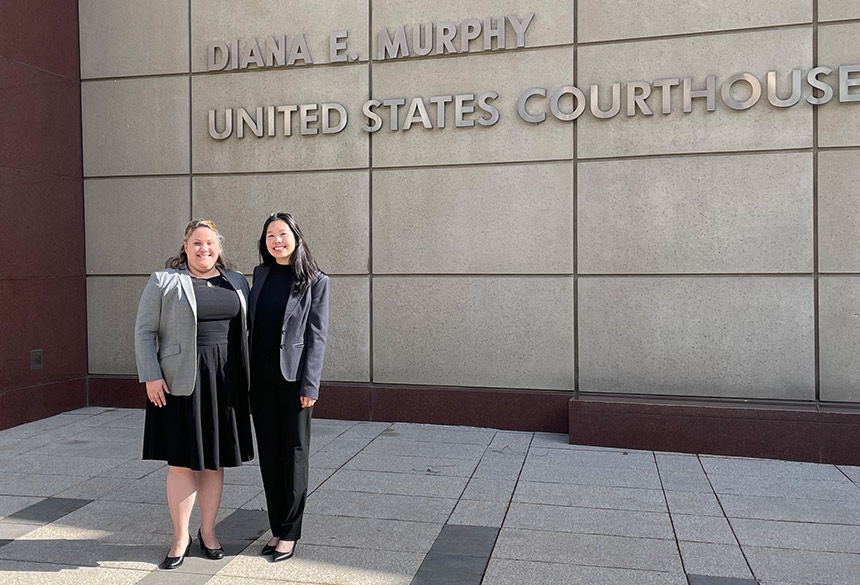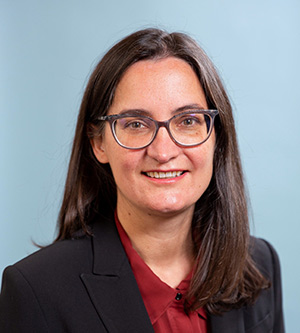
By Sarah Weld
Law students rarely get the chance to argue in federal court. But after months of careful preparation and practice sessions, that’s just where Samuelson Law, Technology & Public Policy Clinic 2L Jennifer Sun found herself last month.
On behalf of the Reporters Committee for Freedom of the Press, Sun and Supervising Attorney Megan Graham argued that the public has the right to access the government’s requests for electronic surveillance records, and the court orders resulting from those requests.
Sun was surprised by more than a few things about her argument in the United States District Court of Minnesota. First, the courtroom was in a high-rise on the 14th floor, not a stately building with columns. Then she had to quickly overhaul her well-rehearsed opening argument on the fly. But mostly, she discovered that judges are people and the experience felt like, well, a friendly chat.
“I was surprised by how collegial and conversational the whole thing was. It wasn’t the adversarial experience I had imagined,” says Sun, whose preparation included simulations with Berkeley Law Dean Erwin Chemerinsky and Professor Orin Kerr. “A court hearing is live and active. You’re anticipating and trying to shape the argument as it’s proceeding and flowing.”
The April 21 argument was the latest step in a lawsuit the clinic filed in December 2020. The suit asks the court to make changes to its sealing practices related to certain types of search warrant materials and surveillance orders, arguing that the First Amendment and common law require public access to them.
Seeking transparency
Sun and Graham pushed for unsealing the electronic surveillance records and transparency-oriented policy changes to ensure the public’s right of access is vindicated once any case-specific need for sealing has concluded.
“We’re saying that the public needs to know what decisions a court is making because the courts work for the public,” says Sun, a media company product manager before law school who will work in the privacy and security practice at a law firm this summer.
Under the Stored Communications Act, the Pen Register Act, and other surveillance authorities, the government can compel third parties like Google, Facebook, and other companies to disclose the contents of, or information about, users’ communications. This can include things like emails, phone records, location data, and other information collected by the companies.
But the documents related to the government’s requests for court orders and warrants are often hidden from public view.
The Reporters Committee, which has a longstanding interest in transparency and access to court records, asked the clinic for help with this issue in 2019.
“In recent years, the Reporters Committee has been particularly worried about the public’s access to electronic surveillance requests, and about government requests about reporters’ contacts with their sources,” Graham says. “The Reporters Committee’s work in this area has done a lot to increase the public’s and the press’s access to information about how the government uses various surveillance authorities.”
Productive partnership
“We are incredibly grateful for the top-notch legal representation that the clinic, and Megan and Jen in particular, have provided in this important case,” says Katie Townsend, deputy executive director and legal director at the Reporters Committee. “Their briefing to the district court and thorough preparation for the hearing showed not only a mastery of the complex set of legal precedents and rules that apply to the sealing and unsealing of electronic surveillance court filings, but also their understanding of the practical considerations that would be front of mind for the district court.”

The Samuelson Clinic works to give students oral advocacy opportunities as frequently as possible, and they have testified before the Copyright Office and advocated before the Oakland City Council.
“The heart of Berkeley’s emphasis on experiential education is putting students into the role of a lawyer, and there is nothing quite like having students stand up and advocate before decision-makers,” says Catherine Crump, the clinic’s director and co-counsel in the case.
The chance for law students to argue substantive motions in federal court, however, is rare.
“There are real stakes here, and Jen got to fly halfway across the country to represent the Reporters Committee in federal court. And she’ll carry the lessons learned with her into her future career,” Graham says.
Valuing student voices
Students often bring a fresh perspective to legal approaches, Graham notes, praising the three students — Jonathan Abrams ’22, Daniela del Rosario Wertheimer ’23, and Sun — who co-wrote the opening brief. She also touted the contributions of previous students who did the initial research and drafted the case-initiating documents: David Fang ’21, Catherine Harris ’21, Allan Holder ’21, Caroline Soussloff ’20, Schuyler Standley ’21, and Samuelson Clinic legal intern Korica Simon.
“They came at it with energy and enthusiasm and a fine-toothed comb. Any time we had an open question they would dive deep into the weeds to find another angle,” Graham says.
According to Sun, her hands-on clinic work — which included writing and filing two briefs, plus preparing and delivering an oral argument — is invaluable.
“It’s been an incredible learning experience. I couldn’t have done it without Catherine and Megan’s guidance,” she says.
The clinic expects the judge’s decision sometime in the next few months.
Graham says: “There’s a real hope that Minnesota can be a model district for how to protect the public’s interest in knowing what the government and the courts are doing, and how to provide public access to electronic surveillance warrants and orders.”